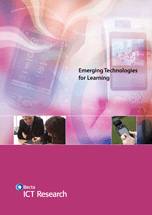Emerging Technologies for Learning
BECTA
,

|

|
 Diese Seite wurde seit 1 Jahr inhaltlich nicht mehr aktualisiert.
Unter Umständen ist sie nicht mehr aktuell.
Diese Seite wurde seit 1 Jahr inhaltlich nicht mehr aktualisiert.
Unter Umständen ist sie nicht mehr aktuell.
 Zusammenfassungen
Zusammenfassungen
 This document covers emerging technologies and some of the future trends that are likely to have an impact on education
This document covers emerging technologies and some of the future trends that are likely to have an impact on education Fünf kurze Aufsätze enthält dieser Research Report, dessen Absicht es ist, "to inform readers about the potential for technology to transform our ways of working, learning and interacting over the next three to five years." Unterschiedlich im Aufbau, aber durchweg sehr anschaulich mit Hinweisen auf laufende Pilotprojekte werden folgende Themen näher beleuchtet: "mobile technologies", "the ambient web", "the future of human-computer interaction", "social networks" und "the broadband home".
Fünf kurze Aufsätze enthält dieser Research Report, dessen Absicht es ist, "to inform readers about the potential for technology to transform our ways of working, learning and interacting over the next three to five years." Unterschiedlich im Aufbau, aber durchweg sehr anschaulich mit Hinweisen auf laufende Pilotprojekte werden folgende Themen näher beleuchtet: "mobile technologies", "the ambient web", "the future of human-computer interaction", "social networks" und "the broadband home". Wiederkehrende Stichworte dieses Reports sind connectivity, personalisation, die Beobachtung, dass Medienkonsumenten zu "creators and producers" von Informationen werden, und welche Chancen und Herausforderungen für Lehrende damit verbunden sind.
Quelle: http://www.weiterbildungsblog.de
 Bemerkungen zu dieser Broschüre
Bemerkungen zu dieser Broschüre
 Leider ist die ursprünglich im Biblionetz erfasste URL eines Volltextes seit mehr als sechs Monaten nicht mehr gültig (Fehlermeldung 404) und wurde deshalb gelöscht. Es ist mir nicht bekannt, ob das Dokument unter einer anderen Adresse noch frei auf dem Internet verfügbar ist.
Leider ist die ursprünglich im Biblionetz erfasste URL eines Volltextes seit mehr als sechs Monaten nicht mehr gültig (Fehlermeldung 404) und wurde deshalb gelöscht. Es ist mir nicht bekannt, ob das Dokument unter einer anderen Adresse noch frei auf dem Internet verfügbar ist. Kapitel
Kapitel 
- 1. Mobile technologies: transforming the future of learning (Geoff Stead)
- 2. The ambient web (Bill Sharpe)
- 3. The future of human-computer interaction (Paul Anderson)
- 4. Social networks (Leon Cych)
- 5. The broadband home (Michael Philpott)
 Diese Broschüre erwähnt ...
Diese Broschüre erwähnt ...
 Diese Broschüre erwähnt vermutlich nicht ...
Diese Broschüre erwähnt vermutlich nicht ... 
 Nicht erwähnte Begriffe | Bildung, del.icio.us, Digitalisierung, Kinder, LehrerIn, RSS, Unterricht, Wiki in education |
 Tagcloud
Tagcloud
 Zitate in der Broschüre
Zitate in der Broschüre
 The final lesson is a softer one. We found that the best way to
understand how to fit mobile learning into your teaching is to try
it out yourself. There is a bit of technical understanding that tutors
need to have before starting, but most of the learning for tutors
and students can take place on the job.
The final lesson is a softer one. We found that the best way to
understand how to fit mobile learning into your teaching is to try
it out yourself. There is a bit of technical understanding that tutors
need to have before starting, but most of the learning for tutors
and students can take place on the job. The importance of ownership:
Mobile devices are not the same as library books. The more you
use them, the harder it becomes to give them back and the
more they become part of your life resources. Learners who
invest the time in learning to use them develop a strong sense
of ownership and learning autonomy.
The importance of ownership:
Mobile devices are not the same as library books. The more you
use them, the harder it becomes to give them back and the
more they become part of your life resources. Learners who
invest the time in learning to use them develop a strong sense
of ownership and learning autonomy. Zitationsgraph
Zitationsgraph
 Zitationsgraph (Beta-Test mit vis.js)
Zitationsgraph (Beta-Test mit vis.js)
 3 Erwähnungen
3 Erwähnungen 
- Using wiki technology to support student engagement - Lessons from the trenches (Melissa Cole) (2009)


- The PLE Conference 2013 - Learning and Diversity in the Cities of the Future (Ilona Buchem, Graham Attwell, Gemma Tur) (2013)


- Technology Enhanced Textbook Provoking active ways of Learning (Wolfgang Neuhaus, Jürgen Kirstein, Volkhard Nordmeier)

- Technology Enhanced Textbook Provoking active ways of Learning (Wolfgang Neuhaus, Jürgen Kirstein, Volkhard Nordmeier)
- Teaching crowds - Learning and Social Media (Jon Dron, Terry Anderson) (2014)
 Volltext dieses Dokuments
Volltext dieses Dokuments
 Anderswo suchen
Anderswo suchen 
 Beat und diese Broschüre
Beat und diese Broschüre
Beat war Co-Leiter des ICT-Kompetenzzentrums TOP während er diese Broschüre ins Biblionetz aufgenommen hat. Die bisher letzte Bearbeitung erfolgte während seiner Zeit am Institut für Medien und Schule. Beat besitzt kein physisches, aber ein digitales Exemplar. (das er aber aus Urheberrechtsgründen nicht einfach weitergeben darf). Es gibt bisher nur wenige Objekte im Biblionetz, die dieses Werk zitieren.









 GPS
GPS Lernen
Lernen mobile learning
mobile learning Podcast
Podcast Schule
Schule Usability
Usability Weblogs
Weblogs Wireless Computing an Schulen
Wireless Computing an Schulen WLAN / Wireless LAN
WLAN / Wireless LAN ZigBee
ZigBee

 (
(

 , 914 kByte)
, 914 kByte)  Biblionetz-History
Biblionetz-History